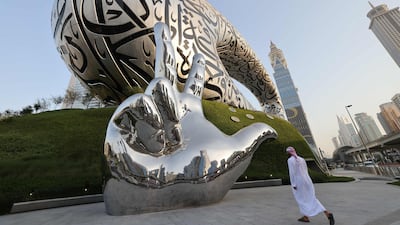The UAE's non-oil private sector economy improved at a “robust” pace in September as strong new business growth continued to drive increases in output and employment.
The S&P Global Purchasing Managers’ Index reading for the UAE stood at 56.1 in September, after hitting a three-year high of 56.7 in August.
A reading above the neutral level of 50 indicates growth, while one below it points to a contraction.
Despite the slight decline from August's nine-month high, the rate of new order growth was sharp and faster than the trend observed since the survey began in August 2009.
Surveyed businesses cited improving market conditions, with sales from abroad increasing in September. The rise in demand encouraged businesses to raise their activity sharply, the survey said.
“At a time of heightened global recession risks, these findings suggest that domestic businesses are keeping well clear of economic storms in other regions, helped by above-trend rates of growth in output and new business as the country continues to recover from the pandemic,” said David Owen, an economist at S&P Global Market Intelligence.
“"Low price pressures are also helping to drive growth.”
The Arab world's second-largest economy is set to expand by 5.4 per cent this year, according to the UAE Central Bank.
Emirates NBD forecasts that the economy will expand 7 per cent in 2022, due to a higher estimate for the energy industry's output and the “robust growth” of its non-oil sector, setting up the country for its fastest annual expansion since 2011, when output grew by 6.9 per cent.
Meanwhile, Abu Dhabi Commercial Bank projects growth of 6.2 per cent, largely on the back of strong real non-oil gross domestic product growth.
The UAE’s foreign trade for the first six months of this year exceeded Dh1 trillion ($272 billion), compared with Dh840bn for the same period before the Covid-19 pandemic.
The tourism sector’s revenue exceeded Dh19bn during the first half of this year and total hotel guests in the same period reached 12 million. Growth in the number of hotel guests was up 42 per cent, compared with the same period before the pandemic.
In Dubai, average residential property prices increased by 10 per cent in the year to June, with apartment prices about 9 per cent higher on average and villa prices increasing by 19 per cent, a CBRE report found.
In July, Dubai also recorded the highest number of sales transactions in the past 12 years, Property Finder said.
Abu Dhabi recorded 7,474 property transactions worth more than Dh22.51 billion in the first six months of the year.
The PMI survey showed that strong client demand and project backlogs meant that businesses continued to face strains on their capacity, leading to a solid increase in outstanding orders.
To boost output, non-oil businesses recorded a further increase in employment, broadly similar to that reported in August.
Lower energy and commodity prices helped to contain cost inflation, compared with the first half of the year. As a result, output charges were reduced for the fifth month in a row as businesses looked to boost sales growth through competitive pricing.
The survey showed that output expectations for the coming year improved for the first time since June, as a higher proportion of companies expect activity to improve due to stronger order books.


